Release of Istanbul mayor’s son-in-law stirs debate
ANKARA

Politicians and social media users have lambasted an Istanbul court after it ordered the release of Istanbul Metropolitan Mayor Kadir Topbaş’s son-in-law Ömer Faruk Kavurmacı, who was previously detained in a probe into the Gülenist movement due to health problems.
Kavurmacı was released on health grounds on May 4 pending trial despite an official report that 841 chronically sick inmates are still awaiting release from prisons.
Topbaş’s son-in-law was arrested as part of an operation against the Turkish Confederation of Businessmen and Industrialists (TUSKON), which was affiliated with the Gülenist movement before being released by the Istanbul 5th Criminal Court of Peace on the grounds that prison conditions were having a negative effect on the suspect, who was diagnosed with epilepsy in 2005.
In its ruling, the court stated that the continuation of Kavurmacı’s imprisonment could cause his health to deteriorate.
Kavurmacı’s release prompted outrage from Turkey’s opposition parties. “I am asking why [Kavurmacı] was released, and why those in the same position have not been released. That’s why I am asking,” main opposition Republican People’s Party (CHP) leader Kemal Kılıçdaroğlu said during a party group meeting in Ankara on May 9.
“Currently there are 841 waiting to die in prison due to their serious and continuous health situations. Why are these people not being released?” the chairman said, referring to statistics released by the Justice Ministry on May 8, upon the demand of CHP lawmaker Gamze Akkuş İlgezdi.
“The number of inmates who have not been released although they have been sick for the last five years amounts to 451. Upon what kind of morality have you not released these? Is this what you call conscience? What is this for God’s sake?” Kılıçdaroğlu said.
Nationalist Movement Party (MHP) leader Devlet Bahçeli also lashed out against Kavurmacı’s release. Speaking to reporters following a party group meeting in Ankara on May 9, Bahçeli said: “The fight against FETÖ [Fethullahist Terrorist Organization] should continue uninterrupted. Regardless of who it is, where it extends and who the kin of the suspect is, there should not be any privilege granted to anyone.”
The Peoples’ Democratic Party (HDP) also reacted against Kavurmacı’s release on May 9 during its party group meeting. “A metropolitan mayor’s son-in-law, who was detained on coup charges, is being released on the grounds of having health problems and a sleeping disorder. İdris Baluken [HDP deputy], who put his signature to a joint petition against the [July 2016] coup which was also signed by the prime minister, parliamentary speaker and opposition leaders, is arrested while in a hospital bunk bed and put in prison. Is this justice?” HDP spokesman Osman Baydemir said.
Meanwhile, lawyer Burak Bekiroğlu submitted a petition on May 9 to an Istanbul court, demanding an arrest warrant for Kavurmacı. In his petition, the lawyer said, “Due to this dubious release decision, which has wounded the public conscious deeply and is not acceptable by the people, we ask from your honorable institution that you correct this grave mistake and issue an arrest warrant for the suspect Ömer Faruk Kavurmacı.”
Justice Ministry: 841 chronic sick prisoners awaiting early release
Some 841 chronically sick inmates are waiting to be freed from prisons as Forensic Medicine Institute doctors have examined them and courts have approved their release, according to a Justice Ministry report released on May 9.
Of the 841 sick prisoners, including 31 women, 795 have been convicted while 46 others are under arrest.
Forensic Medicine Institute doctors suggested that another 1,086 sick inmates should also be released due to their medical conditions, but these prisoners were denied early release by the ministry, according to the report.
Some 451 inmates who were selected by Forensic Medicine Institute doctors for early release have died in prisons in the last five years before the ministry even examined their demand to be freed.
 Politicians and social media users have lambasted an Istanbul court after it ordered the release of Istanbul Metropolitan Mayor Kadir Topbaş’s son-in-law Ömer Faruk Kavurmacı, who was previously detained in a probe into the Gülenist movement due to health problems.
Politicians and social media users have lambasted an Istanbul court after it ordered the release of Istanbul Metropolitan Mayor Kadir Topbaş’s son-in-law Ömer Faruk Kavurmacı, who was previously detained in a probe into the Gülenist movement due to health problems.